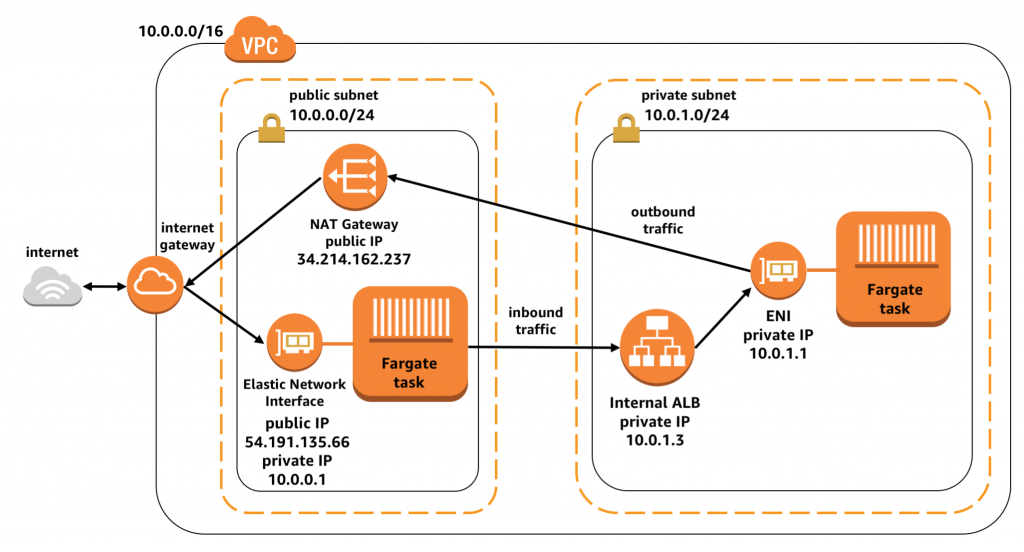AWS Compute Blog
Category: Amazon EC2 Container Service
Optimizing Amazon ECS task density using awsvpc network mode
This post is contributed by Tony Pujals | Senior Developer Advocate, AWS AWS recently increased the number of elastic network interfaces available when you run tasks on Amazon ECS. Use the account setting called awsvpcTrunking. If you use the Amazon EC2 launch type and task networking (awsvpc network mode), you can now run more […]
Using AWS App Mesh with Fargate
This post is contributed by Tony Pujals | Senior Developer Advocate, AWS AWS App Mesh is a service mesh, which provides a framework to control and monitor services spanning multiple AWS compute environments. My previous post provided a walkthrough to get you started. In it, I showed deploying a simple microservice application to Amazon ECS […]
Automatically update instances in an Amazon ECS cluster using the AMI ID parameter
UPDATE – Mar 15, 2021 – We’ve updated this post to reflect the guidance that customers should be updating their Amazon ECS clusters with Amazon Linux 2 AMIs. Customers should fully confirm application functionality before moving to Amazon Linux 2. This post is contributed by Adam McLean – Solutions Developer at AWS and Chirill Cucereavii […]
Scheduling GPUs for deep learning tasks on Amazon ECS
This post is contributed by Brent Langston – Sr. Developer Advocate, Amazon Container Services Last week, AWS announced enhanced Amazon Elastic Container Service (Amazon ECS) support for GPU-enabled EC2 instances. This means that now GPUs are first class resources that can be requested in your task definition, and scheduled on your cluster by ECS. Previously, […]
Migrate Wildfly Cluster to Amazon ECS using Service Discovery
This post is courtesy of Vidya Narasimhan, AWS Solutions Architect 1. Overview Java Enterprise Edition has been an important server-side platform for over a decade for developing mission-critical & large-scale applications amongst enterprises. High-availability & fault tolerance for such applications is typically achieved through built-in JEE clustering provided by the platform. JEE clustering represents a […]
Migrating Your Amazon ECS Containers to AWS Fargate
AWS Fargate is a new compute engine that works with Amazon Elastic Container Service (ECS) to run containers without having to manage servers or clusters. What does this mean? With Fargate, you no longer need to provision or manage a single virtual machine; you can just create tasks and run them directly! Fargate uses the same API actions as ECS, […]
Task Networking in AWS Fargate
AWS Fargate is a new compute engine for containers that allows you to focus on running your application without needing to provision, monitor, or manage the underlying compute infrastructure. You package your application into a Docker container that you can then launch using your container orchestration tool of choice. Fargate allows you to use containers […]
Building Blocks of Amazon ECS
So, what’s Amazon Elastic Container Service (ECS)? ECS is a managed service for running containers on AWS, designed to make it easy to run applications in the cloud without worrying about configuring the environment for your code to run in. Using ECS, you can easily deploy containers to host a simple website or run complex […]
Migrating .NET Classic Applications to Amazon ECS Using Windows Containers
This post contributed by Sundar Narasiman, Arun Kannan, and Thomas Fuller. AWS recently announced the general availability of Windows container management for Amazon Elastic Container Service (Amazon ECS). Docker containers and Amazon ECS make it easy to run and scale applications on a virtual machine by abstracting the complex cluster management and setup needed. Classic .NET […]
Maintaining Transport Layer Security All the Way to Your Container: Using the Network Load Balancer with Amazon ECS
This post contributed by AWS Senior Cloud Infrastructure Architect Anabell St Vincent. Some systems or applications require Transport Layer Security (TLS) traffic from the client all the way through to the Docker container, without offloading or terminating certificates at a load balancer. Some highly time-sensitive services may require communication over TLS without any decryption and […]








